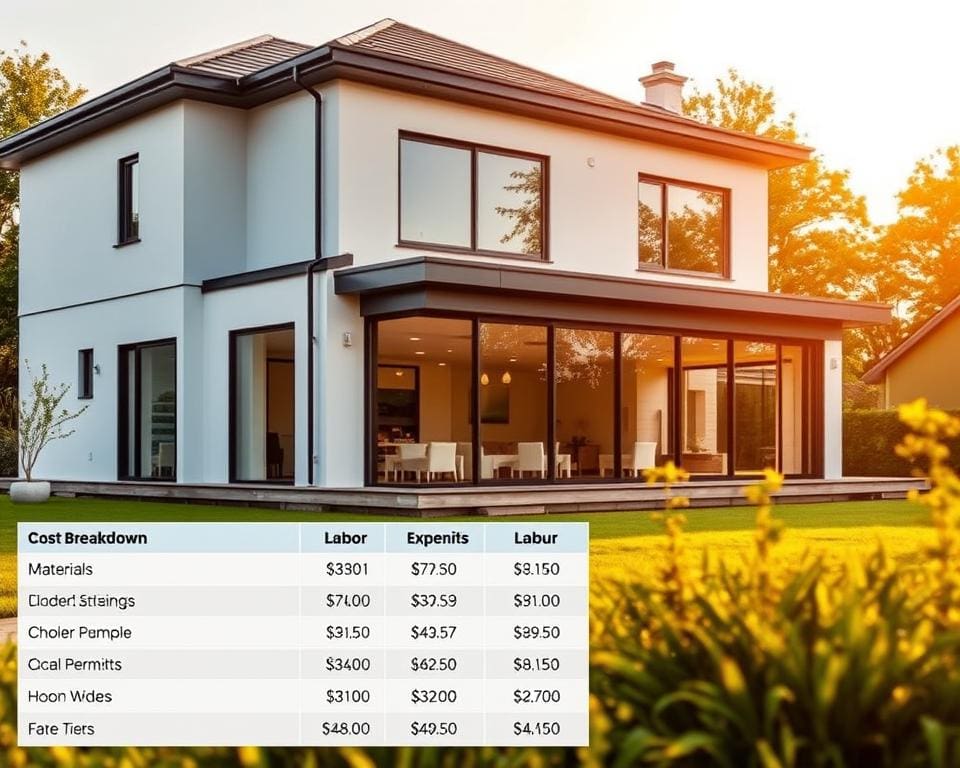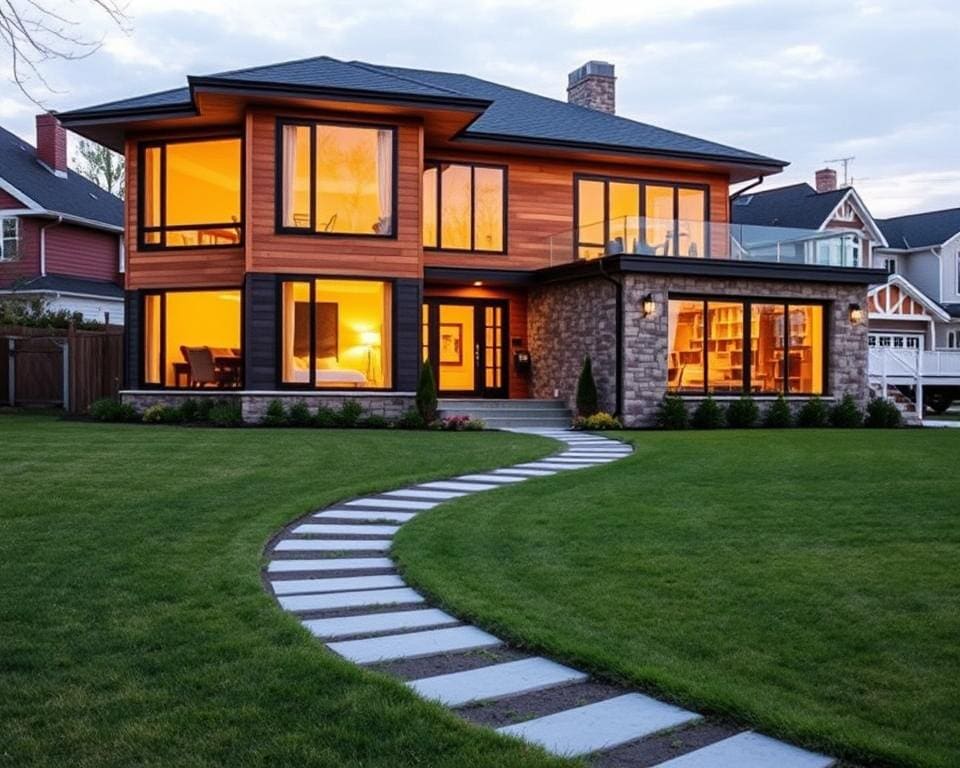When considering a home renovation, one of the most common queries homeowners have is, “How much for a extension on the house?” Understanding the cost of house extension is crucial for anyone looking to enhance their living space. Home extension costs can vary significantly based on several factors, including the size and complexity of the project, the materials selected, and regional differences in labour rates.
In this article, we will explore the intricacies of budgeting for a house extension, providing valuable insights that will help homeowners navigate their financial options. Armed with this knowledge, you can take the first steps toward realising your dream home.
Understanding Home Extension Costs
When contemplating building a house extension, understanding home extension costs is essential for effective budgeting. Several key factors can significantly influence the overall expenses associated with such projects. Knowing these elements helps homeowners make informed decisions and avoid unexpected financial burdens.
Factors Influencing Costs
The costs related to a home extension can vary widely based on numerous factors, including:
- Planning approval: Obtaining the necessary permits can introduce additional costs, depending on local regulations.
- Structural integrity: The existing condition of the property often affects the modification’s price.
- Land size: Larger properties may incur higher costs simply due to the increased space required for construction.
- Design complexity: A bespoke design will typically lead to higher expenses in comparison to a standard layout.
- Materials chosen: The quality and type of materials impact both longevity and costs.
Average Costs by Extension Type
The type of extension also substantially affects house extension prices. Here’s an overview of the average costs associated with various extension types:
- Single-storey extensions: Ranging from £15,000 to £50,000, these are often the most affordable and simplest to construct.
- Double-storey extensions: These can cost between £30,000 and £90,000, offering more space but requiring more complex planning and construction.
- Loft conversions: Typically priced between £20,000 and £60,000, these extensions can add significant value when combined with additional living space.

How Much For A Extension On The House: A Breakdown
When considering a house extension, understanding the specific costs involved plays a crucial role in planning. A variety of factors contribute to house extension prices, particularly the type of extension and the location where the work will take place. This section will unravel the typical price ranges associated with different extensions, shedding light on how location variance can influence overall expenses.
Price Ranges for Different Extensions
The cost of house extension can vary significantly based on the nature of the project. Here are some typical price ranges:
- Single-storey extension: £20,000 – £40,000
- Double-storey extension: £45,000 – £85,000
- Conservatory: £10,000 – £30,000
These figures represent base costs and can increase depending on the complexity of the design and the finish quality desired. Always seek multiple quotes to secure the best possible price.
Location-Based Variance in Prices
Location plays a pivotal role in the cost of house extension. Urban areas often experience higher labour costs, leading to increased overall expenses. In contrast, rural locations may provide more competitive pricing due to lower demand for contractors. Below are some factors to consider:
- Urban settings typically incur 10-20% higher costs than rural areas.
- Regional differences can see variations in local materials pricing and labour availability.
- Local council regulations might affect the timeline and cost, especially in metropolitan zones.
Building a House Extension: What You Need to Know
Embarking on the journey of building a house extension is an exciting venture that can greatly enhance your living space. Homeowners must navigate several crucial aspects, particularly concerning planning permissions and the legal framework surrounding such projects. Understanding these elements will not only streamline the process but also safeguard against potential issues down the line.
Planning Permissions and Legal Considerations
Before commencing any construction, it is vital to investigate whether you require planning permissions for your house extension. The regulations governing planning a house extension vary by locality, so it is advisable to check with your local council. Failing to obtain the necessary permissions can lead to significant complications, including fines or the requirement to dismantle unauthorized work.
Key considerations include:
- The scale and height of your proposed extension
- Impact on surrounding properties and the local environment
- Compliance with building regulations, which ensure safety and accessibility
Gathering the appropriate documentation is crucial. Homeowners may need to supply:
- Detailed plans of the proposed extension
- Site surveys demonstrating the extension’s impact on the property
- Evidence of consultation with neighbours, if necessary
Being well-informed about these legal requirements will facilitate a smoother journey towards successfully building a house extension. An informed approach enables homeowners to avoid common pitfalls and enjoy a seamless construction experience.
Obtaining House Extension Quotes
When embarking on a house extension project, obtaining accurate house extension quotes is essential. Clear understanding of the quotes ensures you can make informed decisions and manage your budget effectively. Knowing how to communicate with potential contractors plays a critical role in this process.
How to Get Accurate Quotes
To gather house extension quotes that reflect true costs, consider the following approaches:
- Invite multiple contractors to your property for site assessments.
- Provide detailed specifications about your envisioned extension.
- Ask for itemised quotes, breaking down Labour, materials, and any additional costs.
- Establish a timeline for project completion to help manage potential delays.
Tips for Comparing Contractors
Understanding which contractor to choose can be challenging. Here are some helpful tips for comparing contractors effectively:
- Review their credentials, ensuring they hold relevant qualifications.
- Examine their portfolio of past work to assess quality and style.
- Seek customer feedback through online reviews or testimonials.
- Discuss warranties offered on their work to gauge reliability.
Creating a House Extension Budget
Crafting a comprehensive house extension budget is a fundamental step in the journey of planning a house extension. Begin by identifying all initial design costs, which could include architect fees, plans, and consultations. These costs will set the groundwork for your financial framework and help ensure that every aspect of the project is considered upfront.
Next, it’s crucial to factor in construction fees that encompass labour, materials, and possible permits. Understanding these elements will empower homeowners to estimate more accurately and avoid unnecessary surprises. Many choose to allocate an additional contingency fund, typically around 10-15% of the total budget, to cover any unforeseen expenses that may arise during the construction process.
Finally, evaluating your overall financial capabilities will guide your budgeting decisions. Take the time to assess existing savings, potential loans, or financing options. This self-evaluation is necessary to ensure readiness for the commitment a house extension entails. By meticulously planning a comprehensive house extension budget, you will pave the way for a more successful and stress-free home improvement experience.









